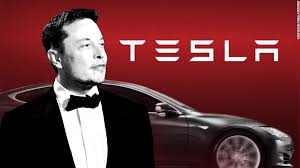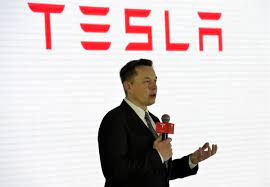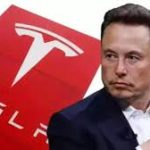Elon Musk’s Tesla Reaches $1.36 Trillion Market Cap Milestone

Elon Musk’s Tesla Reaches $1.36 Trillion Market Cap Milestone
Introduction: Elon Musk’s Tesla, the electric vehicle giant, has reached a monumental milestone with its market cap soaring to $1.36 trillion. This achievement marks a significant moment in the company’s journey, further solidifying Tesla’s place at the forefront of the automotive and energy industries. Tesla’s rise has been nothing short of extraordinary, transforming from a niche player in the electric vehicle market to a globally recognized brand known for innovation in sustainability, technology, and clean energy solutions. In this article, we explore how Tesla reached this $1.36 trillion market cap, what it means for the future of the company, and the broader implications of Tesla’s success on the automotive industry and beyond.
Tesla’s Rise to $1.36 Trillion: Tesla’s journey to becoming a trillion-dollar company has been fueled by its constant innovation, groundbreaking technology, and a unique ability to challenge traditional automotive industry norms. The company’s focus on electric vehicles, energy storage, and solar technology has set it apart from traditional automakers, leading it to become the most valuable car manufacturer in the world.
Tesla’s stock price has seen exponential growth over the past few years, driven by strong demand for its electric vehicles, particularly its Model 3 and Model Y, as well as its ambitious plans for future vehicles such as the Cybertruck and the Tesla Semi. The company has demonstrated an impressive ability to scale production and meet demand, which has resulted in consistent profitability and a growing global market presence.
In addition to its electric vehicles, Tesla’s investments in energy solutions, such as solar power and energy storage systems, have helped diversify its revenue streams and position the company as a leader in the transition to renewable energy. Tesla’s energy storage products, such as the Powerwall and Powerpack, are increasingly being adopted by both residential and commercial customers, further driving growth and solidifying Tesla’s place in the clean energy sector.
Tesla’s success is also closely tied to its CEO, Elon Musk, whose leadership and vision have been instrumental in driving the company’s growth. Musk’s ability to inspire investors and challenge conventional thinking has made Tesla one of the most valuable and disruptive companies in the world.
What the $1.36 Trillion Milestone Means for Tesla: Reaching a $1.36 trillion market cap represents a major milestone for Tesla and validates the company’s long-term strategy and vision. With a market cap of this size, Tesla now sits among the most valuable companies in the world, alongside tech giants like Apple, Microsoft, and Amazon. This achievement not only reflects Tesla’s financial success but also highlights its cultural and technological significance in shaping the future of transportation, energy, and sustainability.
For Tesla, the $1.36 trillion market cap brings several key advantages. First, it provides the company with ample resources to continue its ambitious expansion plans. Tesla has already made significant strides in expanding its global footprint, with factories in the U.S., China, and Germany. With this new financial strength, Tesla is poised to further expand its production capacity, accelerate the development of new vehicles, and continue investing in research and development to maintain its competitive edge.
Second, reaching this milestone enhances Tesla’s ability to attract top talent and secure partnerships. As the company continues to expand into new markets and industries, its ability to hire the best engineers, designers, and business leaders will be crucial to sustaining its momentum. Tesla’s success also positions it as an attractive partner for collaborations in areas like autonomous driving technology, battery innovation, and smart grid solutions.
Finally, Tesla’s market cap milestone strengthens its position as a leader in the electric vehicle and clean energy industries. The company’s ability to achieve profitability while scaling production and expanding into new markets is a testament to the viability of electric vehicles as a mainstream transportation solution. With global demand for EVs expected to grow in the coming years, Tesla is well-positioned to capitalize on this trend and continue its growth trajectory.
The Broader Impact on the Automotive Industry: Tesla’s $1.36 trillion market cap milestone has significant implications for the automotive industry as a whole. For decades, the automotive sector has been dominated by traditional manufacturers, such as General Motors, Ford, and Toyota. However, Tesla’s success has upended the industry, forcing established automakers to accelerate their own efforts to transition to electric vehicles.
Tesla’s market dominance and technological advancements have prompted many legacy automakers to invest heavily in electric vehicles, battery technology, and sustainable manufacturing processes. Companies like Ford, General Motors, Volkswagen, and Mercedes-Benz have all announced plans to increase their EV offerings, with some setting ambitious targets to electrify their entire fleets in the coming years. This shift toward electric vehicles represents a critical turning point for the automotive industry, as it seeks to reduce emissions and meet increasingly stringent environmental regulations.
Moreover, Tesla’s success has highlighted the importance of software and technology in the automotive sector. Tesla’s vehicles are known for their advanced driver-assistance systems, over-the-air software updates, and integration with renewable energy products. This focus on technology and connectivity is setting a new standard for the industry, encouraging other automakers to adopt similar features in their own vehicles.
As a result, Tesla is not only reshaping the electric vehicle market but also pushing the entire automotive industry to innovate and adapt to the changing landscape of transportation. The company’s success has accelerated the global transition to electric vehicles, driving investment in EV infrastructure, battery production, and autonomous driving technologies.
Implications for the Clean Energy Industry: In addition to its impact on the automotive sector, Tesla’s success has far-reaching implications for the clean energy industry. Tesla’s energy division, which focuses on solar power and energy storage, has gained increasing attention as the company works to build a comprehensive ecosystem of clean energy products. Tesla’s Powerwall and Powerpack products have become critical tools in helping individuals and businesses transition to renewable energy sources and store excess power for later use.
As Tesla continues to scale its energy business, the company is poised to play a key role in the global transition to clean energy. The $1.36 trillion market cap further reinforces the company’s ability to attract investment and innovation in energy storage and solar power technologies. Musk’s vision of a sustainable energy future, where electric vehicles and renewable energy solutions are integrated seamlessly, is becoming increasingly attainable as Tesla continues to innovate and expand its offerings.
Tesla’s success is also helping to accelerate the adoption of electric vehicles and clean energy solutions in markets around the world. As governments and consumers become more aware of the environmental and economic benefits of electric vehicles and renewable energy, demand for Tesla’s products is expected to continue growing. The company’s market cap milestone serves as a clear signal to the world that clean energy and electric vehicles are not just a passing trend—they are the future of transportation and energy.
Conclusion: Elon Musk’s Tesla reaching a $1.36 trillion market cap is a landmark achievement for both the company and the industries it serves. This milestone underscores Tesla’s success in revolutionizing the automotive and clean energy sectors, as well as its position as a global leader in sustainable technology. Tesla’s ability to achieve profitability while expanding its global presence and advancing its product offerings has set the company on a path toward continued growth and innovation. As the world increasingly shifts toward electric vehicles and renewable energy solutions, Tesla’s success serves as a model for what can be achieved when ambition, technology, and sustainability come together. The $1.36 trillion market cap is just the beginning of what promises to be a long and prosperous journey for Tesla, as it continues to drive the future of transportation and energy.









